Reasons for Discrepancies in Drug Test Results

Passed Home Drug Test but Failed Pre-Employment
Drug testing has become a standard practice for pre-employment screening in many industries. Employers use these tests to ensure a safe work environment and adhere to legal and regulatory requirements. However, discrepancies can arise between the results of home drug tests and professional pre-employment drug tests, leading to confusion and concern for job seekers. This section dives deep into the differences between these testing methods, why discrepancies occur, and what this means for individuals preparing for employment drug screenings.
How Do Home Drug Tests Work?
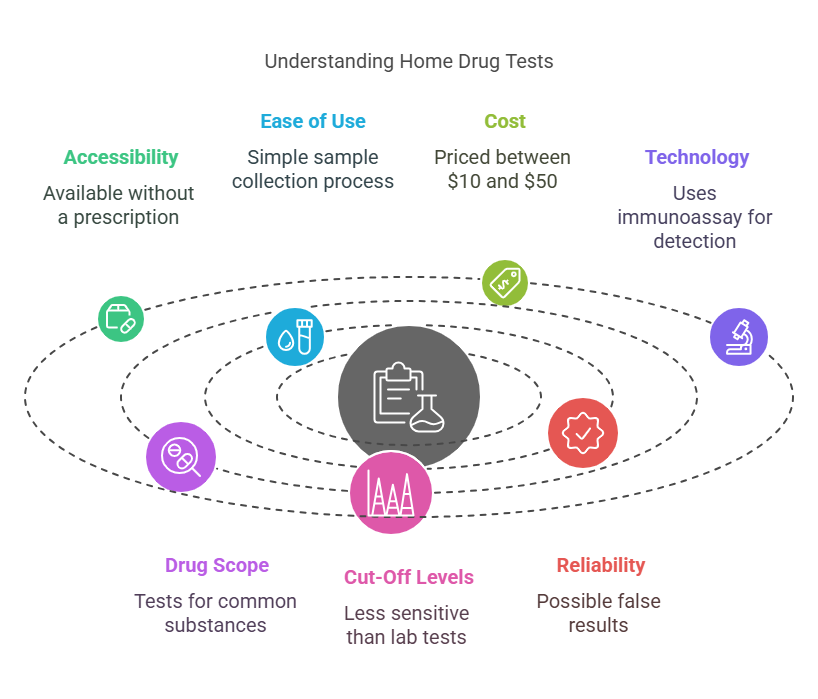
Home drug tests are designed for convenience, allowing individuals to test themselves in private before undergoing professional screening. These tests are:
- Accessible: Available at most pharmacies or online retailers without requiring a prescription.
- Simple to Use: Typically involve collecting a urine sample, applying it to a test strip, and waiting for results.
- Affordable: Priced between $10 and $50, depending on the brand and the number of substances they screen for.
Home drug tests commonly use immunoassay technology, which detects the presence of specific drugs or their metabolites. These tests often provide results within minutes, with a simple pass/fail outcome.
However, home drug tests are limited in scope:
- Drugs Tested: Most kits detect common substances such as marijuana, cocaine, opiates, amphetamines, methamphetamines, and benzodiazepines.
- Cut-Off Levels: These tests are less sensitive than lab-based methods, meaning they may only detect drugs at higher concentrations.
- Reliability: While convenient, these tests can sometimes yield false positives or negatives due to human error, improper storage, or limitations in the testing mechanism.
How Do Pre-Employment Drug Tests Work?
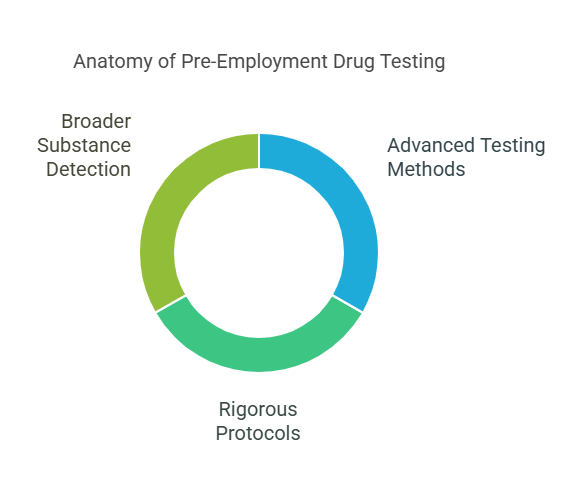
In contrast to home drug tests, pre-employment drug screenings are conducted by certified professionals in controlled environments. Employers partner with licensed laboratories to ensure accurate, reliable, and legally defensible results. These tests include:
1. Advanced Testing Methods
Pre-employment drug tests utilize more sophisticated testing techniques compared to at-home kits. Some of the most common methods include:
- Urinalysis: The most widely used method, capable of detecting a wide range of substances.
- Hair Follicle Testing: Ideal for detecting long-term drug use, as it can identify substances ingested up to 90 days prior.
- Saliva Testing: Useful for detecting recent drug use, typically within the past 24-48 hours.
- Blood Testing: Rare but highly accurate, used in specialized cases where immediate detection is required.
2. Rigorous Protocols
Professional drug tests follow strict chain-of-custody procedures to prevent tampering and ensure the integrity of the sample. This process involves:
- Supervised Collection: Ensures the sample is authentic and unaltered.
- Secure Handling: Samples are sealed and tracked throughout the testing process.
- Confirmation Testing: Positive results from initial screenings are verified using advanced methods like gas chromatography-mass spectrometry (GC-MS) to eliminate false positives.
3. Broader Substance Detection
Pre-employment drug tests often screen for more substances than home kits, including:
- Synthetic opioids (e.g., fentanyl).
- Designer drugs (e.g., synthetic cannabinoids, MDMA).
- Alcohol, in some cases, especially for positions requiring sobriety.
Key Differences Between Home Drug Tests and Pre-Employment Drug Tests
| Feature | Home Drug Test | Pre-Employment Drug Test |
|---|---|---|
| Accuracy | Moderate | High (lab-verified results) |
| Sensitivity | Lower thresholds | Detects smaller traces of substances |
| Substances Detected | Limited (common drugs only) | Broader range (includes synthetic drugs) |
| Detection Window | Shorter detection period | Varies depending on the method (e.g., hair follicle tests detect months of use) |
| Result Verification | None (no follow-up for false positives) | Confirmed by medical review officers (MROs) |
| Environment | Self-administered at home | Controlled and supervised collection |
Why Might You Pass a Home Drug Test but Fail a Pre-Employment Test?
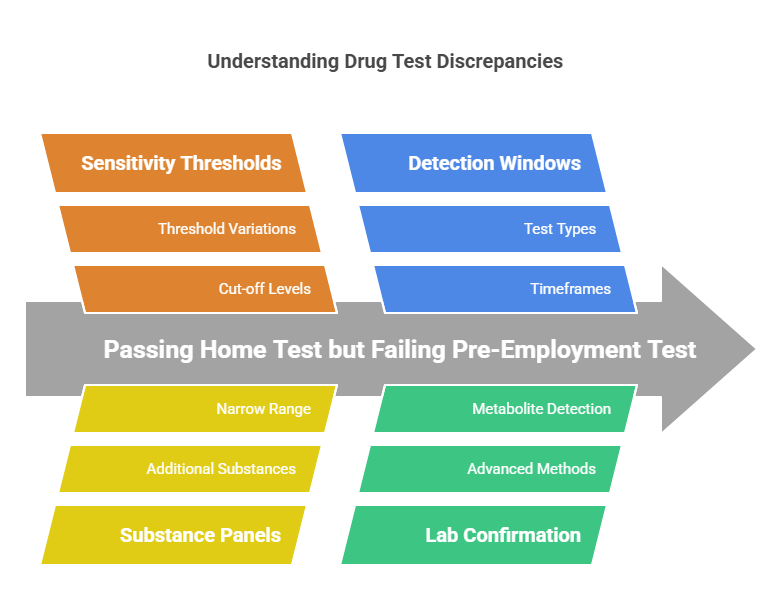
Passing a home drug test only to fail a pre-employment screening can be a frustrating and confusing experience. Below are the most common reasons for such discrepancies:
1. Sensitivity Thresholds
Home drug tests typically have higher cut-off levels, meaning they may not detect drugs present in small quantities. For example:
- A home test for THC may have a cut-off level of 50 ng/mL, while a professional lab might test for levels as low as 15 ng/mL.
- If your THC levels fall between 15-50 ng/mL, you might pass the home test but fail the lab test.
2. Broader Substance Panels in Professional Tests
Home kits often test for a narrow range of substances, typically the “SAMHSA 5” drugs (marijuana, cocaine, opiates, amphetamines, and PCP). Pre-employment drug tests, however, may include additional substances such as:
- Barbiturates.
- Synthetic cannabinoids (K2/Spice).
- Prescription medications like oxycodone.
If a substance you’ve consumed is outside the scope of the home test but included in the pre-employment panel, you may pass one and fail the other.
3. Differences in Detection Windows
The type of test used affects the detection window. For example:
- Urine Tests: Detect recent drug use (1-7 days for most drugs, up to 30 days for heavy marijuana use).
- Hair Tests: Detect drug use over the past 90 days. A home urine test might not detect a drug consumed a month ago, but a hair follicle test could.
4. Lab Confirmation Testing
Professional labs confirm positive results using advanced methods like GC-MS or liquid chromatography-tandem mass spectrometry (LC-MS/MS). This step minimizes errors and detects substances with greater accuracy. Home kits lack this confirmation process, which can lead to false negatives or positives.
5. Drug Metabolites
Pre-employment tests often detect drug metabolites, which are the byproducts of drugs after they’ve been processed by the body. These metabolites can linger in the body long after the effects of the drug have worn off. Home kits might miss these metabolites if they’re present in trace amounts, while professional tests will likely detect them.
Potential Discrepancies and Their Implications
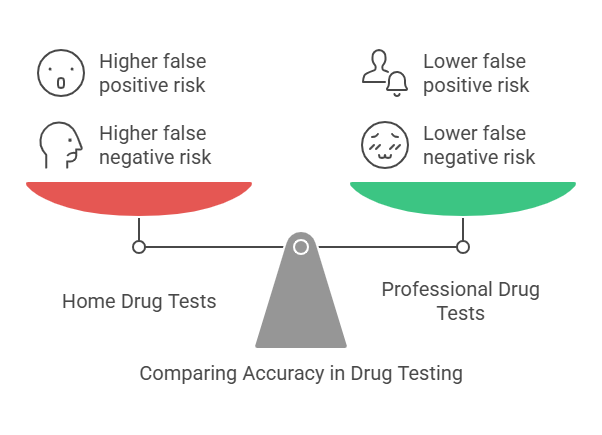
False Negatives in Home Drug Tests
Home tests are prone to false negatives due to:
- Improper sample collection (e.g., dilution).
- Use of expired or faulty kits.
- Testing too soon after drug consumption, before the substance has metabolized.
False Positives in Home Drug Tests
False positives can also occur, potentially caused by:
- Cross-reactivity with other medications or substances.
- Consuming certain foods (e.g., poppy seeds triggering a positive opiate result).
- Variability in manufacturing quality between brands.
Controlled Environment of Professional Tests
Pre-employment drug tests eliminate many of these issues through strict protocols. Samples are collected under supervision, properly stored, and analyzed in certified labs. This ensures accurate and defensible results, even if they differ from home test outcomes.
Key Takeaways
- Home drug tests are a useful first step but have limitations in accuracy, sensitivity, and scope.
- Pre-employment drug tests are far more rigorous, utilizing advanced technology and professional oversight.
- Discrepancies between test results are often due to differences in detection thresholds, substances screened, and testing methods.
This comprehensive understanding of home and professional drug tests provides a foundation for navigating discrepancies and preparing for pre-employment screenings. Let me know when you’re ready for Part 2, which will outline actionable steps to take if you fail a pre-employment drug test.
Steps to Take After Failing a Pre-Employment Drug Test and Services Offered
Failing a pre-employment drug test can be a stressful experience, especially if you had already passed a home test and felt confident about your results. However, it’s important to remember that this isn’t necessarily the end of your job prospects. In this section, we’ll explore actionable steps to address a failed pre-employment drug test, how to prepare for future testing, and the role of professional services like Exact Background Checks in ensuring a fair and reliable screening process.
What to Do After Failing a Pre-Employment Drug Test
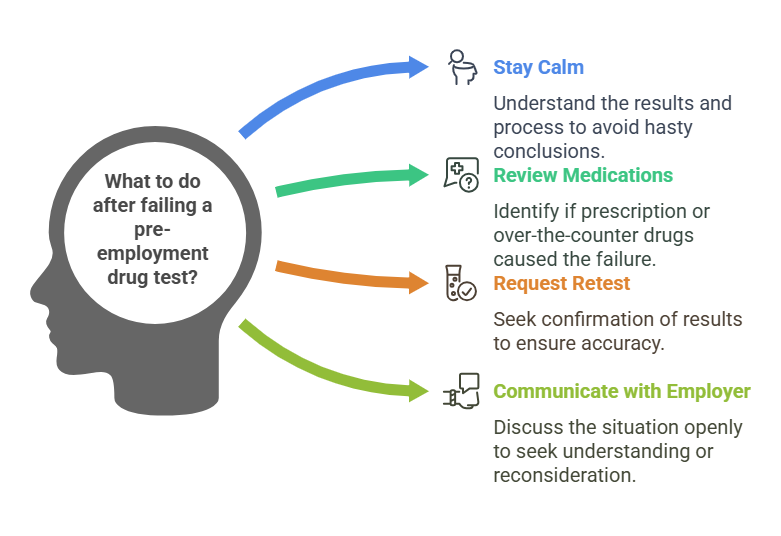
1. Stay Calm and Understand the Results
The first step is to remain calm and avoid jumping to conclusions. Failing a drug test doesn’t always mean immediate disqualification. Instead, focus on understanding the results and the process:
- Request Details: Reach out to the testing facility or your employer to confirm the results and learn which substance(s) triggered the failure.
- Clarify the Testing Method: Knowing whether a urine, hair, saliva, or blood test was used can help you determine the accuracy and detection window of the results.
- Wait for MRO Contact: In many cases, a medical review officer (MRO) will contact you to verify the results and discuss any prescription medications or medical conditions that might have influenced the outcome.
2. Review Prescription Medications and Supplements
If you’re taking any prescription medications or over-the-counter supplements, they could be the reason for the failed test. Some medications and substances that might cause a false positive include:
- Antibiotics: Certain antibiotics like rifampin may trigger false positives for opiates.
- Cold Medications: Decongestants with pseudoephedrine can resemble amphetamines.
- Painkillers: Prescription opioids, even when legally prescribed, can result in a positive test.
- Supplements: Some herbal supplements may contain ingredients that mimic illicit drugs.
3. Request a Retest or Confirmation Test
If you believe the results are inaccurate, you can request a retest or a confirmation test.
- Reanalysis of the Original Sample: Most labs retain your sample for a period of time. You can request that it undergo additional testing, such as gas chromatography-mass spectrometry (GC-MS).
- New Sample Testing: In some cases, employers may allow a second test to ensure fairness.
4. Communicate with the Employer
Honest and proactive communication with your potential employer is crucial.
- Disclose Medications: If prescription drugs caused the failure, provide documentation from your healthcare provider.
- Explain the Situation: If you suspect a false positive or environmental exposure (e.g., second-hand marijuana smoke), explain this to the employer or MRO.
- Request a Fair Review: Employers may be willing to reconsider if you provide valid reasons or evidence.
5. Understand Company Policies
Each employer has its own policies regarding drug testing and failed results. Some may disqualify candidates immediately, while others might allow retesting or offer a chance to explain the circumstances. Review the company’s drug testing policy and ensure you understand your rights.
How to Prepare for Future Drug Tests
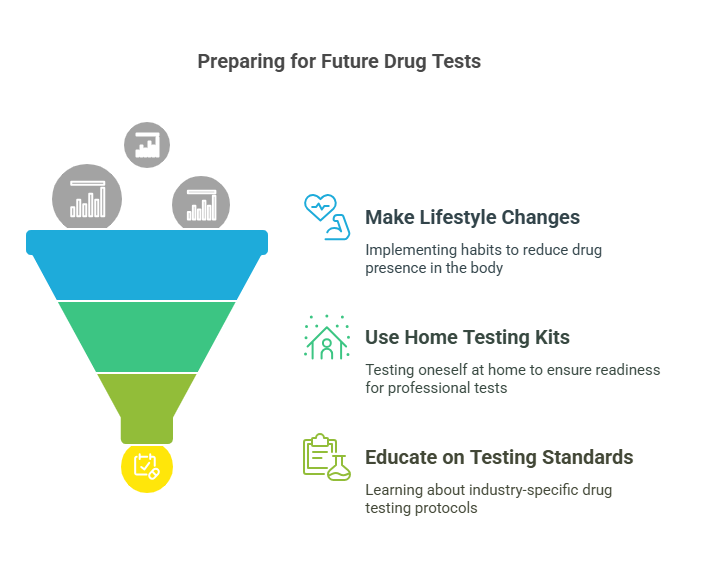
If you’ve failed a pre-employment drug test, it’s important to take steps to avoid similar situations in the future. Here’s how:
1. Understand Drug Detection Windows
Each drug has a unique detection window based on the type of test used:
- Marijuana (THC):
- Urine: Up to 30 days (chronic users).
- Hair: Up to 90 days.
- Saliva: 1-3 days.
- Cocaine:
- Urine: 2-4 days.
- Hair: Up to 90 days.
- Saliva: 1-2 days.
- Amphetamines:
- Urine: 2-5 days.
- Hair: Up to 90 days.
- Saliva: 1-2 days.
Knowing these windows can help you time your test and take precautions if needed.
2. Make Lifestyle Changes
Lifestyle adjustments can help reduce the risk of failing future drug tests:
- Abstain from Drug Use: The most effective way to pass a drug test is to avoid using drugs altogether.
- Hydrate and Exercise: Staying hydrated and engaging in regular exercise can help your body eliminate toxins more efficiently.
- Avoid Risky Environments: Steer clear of situations where you might be exposed to second-hand smoke or other substances.
3. Use Reliable Home Testing Kits
Before taking another professional drug test, consider using a high-quality home drug test kit to check your status. Look for kits that:
- Test for a wide range of substances.
- Have low detection thresholds similar to lab tests.
- Are FDA-approved or CLIA-waived for accuracy.
4. Educate Yourself on Professional Testing Standards
Understanding the testing process can help you better prepare. Research the types of tests commonly used in your industry and the substances they target.
The Role of Exact Background Checks in Drug Screening
Exact Background Checks is a trusted provider of pre-employment screening services, including drug testing and background verification. Their comprehensive services ensure that both employers and job candidates are treated fairly throughout the process.
Services Offered by Exact Background Checks
- Pre-Employment Drug Screening
- Exact Background Checks partners with certified labs to provide reliable drug testing services.
- They offer a variety of testing methods, including urine, hair, saliva, and blood tests.
- Background Verification
- Comprehensive background checks ensure employers hire trustworthy candidates.
- These checks cover criminal records, education verification, and employment history.
- FCRA-Compliant Processes
- Exact Background Checks adheres to the Fair Credit Reporting Act (FCRA) to protect candidates’ rights.
- This includes providing candidates with access to their results and allowing them to dispute inaccuracies.
- Customized Solutions for Employers
- Employers can tailor screening packages to fit their specific needs, including testing for specialized substances.
- Exact Background Checks ensures a seamless and efficient process from start to finish.
Why Choose Exact Background Checks?
- Accuracy and Reliability
- Partnering with certified labs ensures that all test results are accurate and legally defensible.
- Confirmation testing reduces the risk of false positives or negatives.
- Candidate-Friendly Approach
- Transparent processes help candidates understand their rights and responsibilities.
- Candidates have the opportunity to address any concerns with an MRO.
- Legal Compliance
- Exact Background Checks stays up-to-date on all legal and regulatory requirements, ensuring employers remain compliant with drug testing laws.
- Quick Turnaround Times
- Efficient processes ensure that test results are delivered promptly, helping employers make informed hiring decisions without unnecessary delays.
Additional Tips for Job Seekers
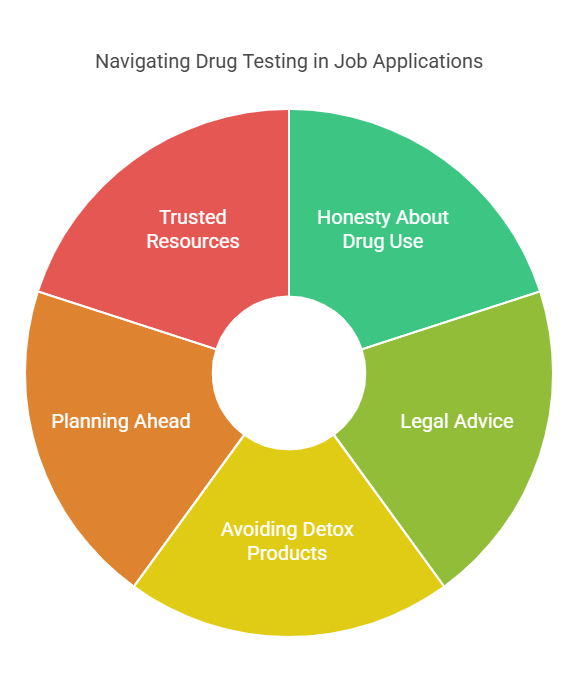
1. Be Honest About Your Drug Use
If you know you’ve used substances that might result in a positive test, consider disclosing this to your potential employer upfront. Honesty can go a long way in building trust.
2. Seek Legal Advice if Necessary
If you believe your failed test is unjust or violates your rights, consult a legal professional. Laws regarding drug testing vary by state, and an attorney can help you navigate complex situations.
3. Avoid “Detox” Products
Many over-the-counter detox products claim to help you pass drug tests, but they are often ineffective and can raise suspicion during testing. Instead, focus on natural detoxification through hydration and healthy living.
4. Plan Ahead for Testing
If you know a drug test is part of the pre-employment process, abstain from drug use well in advance to ensure your system is clear.
5. Leverage Trusted Resources
Work with reputable organizations like Exact Background Checks to ensure the testing process is fair, accurate, and legally compliant.
Legal Aspects of Pre-Employment Drug Testing
1. The Legal Framework Surrounding Drug Testing
Drug testing for employment is subject to various laws and regulations, which vary by country, state, and industry. In the U.S., pre-employment drug testing is legal but must comply with the following:
- Federal Drug Testing Requirements:
Industries regulated by federal agencies, such as transportation (DOT), aviation (FAA), and defense, must adhere to strict drug testing guidelines. - State and Local Laws:
States and cities may have additional laws regulating drug testing. For example:- Recreational Marijuana States: Employers in states where marijuana is legal for recreational use (e.g., California, Colorado) may still prohibit its use in the workplace.
- Medical Marijuana States: Employees with medical marijuana prescriptions may be protected from adverse employment decisions in certain jurisdictions.
- Fair Credit Reporting Act (FCRA):
If drug testing is conducted as part of a background check by a third party, the FCRA requires:- Disclosure and written consent from the candidate.
- The opportunity for candidates to review and dispute results.
2. Employee Rights
As a job candidate, you have specific rights during the drug testing process, including:
- Informed Consent: Employers must obtain your written consent before conducting a drug test.
- Access to Results: You are entitled to see your test results and understand the reason for a failed test.
- Medical Review Process: An MRO must review failed tests to account for valid medical prescriptions or other factors.
- Non-Discrimination: Employers cannot target specific groups of people for drug testing based on race, gender, or disability.
3. Employer Obligations
Employers conducting pre-employment drug tests must:
- Follow federal, state, and local laws regarding drug testing policies.
- Maintain confidentiality of test results.
- Ensure a fair process, including retests or reviews for disputed results.
Frequently Asked Questions (FAQs)
What does a positive urine drug test result mean?
A positive result indicates that the concentration of a specific drug or its metabolites in the urine exceeds the established cutoff level. This suggests recent use or exposure to the substance.
- Next Steps: Positive results are typically confirmed through more precise testing methods (e.g., GC-MS) before final decisions are made.
How accurate are urine drug tests?
Urine drug tests are highly accurate when conducted using standardized procedures and advanced testing technologies. However, the accuracy may be affected by:
- Sample tampering or adulteration.
- Testing outside the substance’s detection window.
- Confirmatory Tests: These reduce the risk of false positives and ensure reliable results.
Can prescription medications cause a positive result?
Yes, certain prescription medications can trigger a positive result if their chemical structure resembles that of illicit drugs. For example:
- Amphetamines: Prescription stimulants like Adderall may lead to a positive test.
- Opiates: Pain medications such as codeine or oxycodone can be flagged.
- What to Do: Inform the testing administrator of any prescribed medications before the test to avoid misunderstandings.
How are inconclusive or invalid test results handled?
Inconclusive results mean the test could not determine the presence or absence of drugs. Causes include:
- Insufficient sample volume.
- Contaminated or tampered samples.
- Equipment errors.
- Resolution: The individual may be asked to provide a new sample for retesting.
What happens if I fail a pre-employment drug test?
Failing a pre-employment drug test typically results in the following:
- Withdrawal of the job offer.
- Disqualification from the hiring process.
- Important Considerations:
- Employers must follow FCRA guidelines when taking adverse action.
- Candidates may request a retest or provide documentation explaining the results (e.g., prescription proof).
What does a positive urine drug test result mean?
A positive result indicates that the concentration of a specific drug or its metabolites in the urine exceeds the established cutoff level. This suggests recent use or exposure to the substance.
- Next Steps: Positive results are typically confirmed through more precise testing methods (e.g., GC-MS) before final decisions are made.
How accurate are urine drug tests?
Urine drug tests are highly accurate when conducted using standardized procedures and advanced testing technologies. However, the accuracy may be affected by:
- Sample tampering or adulteration.
- Testing outside the substance’s detection window.
- Confirmatory Tests: These reduce the risk of false positives and ensure reliable results.
Can prescription medications cause a positive result?
Yes, certain prescription medications can trigger a positive result if their chemical structure resembles that of illicit drugs. For example:
- Amphetamines: Prescription stimulants like Adderall may lead to a positive test.
- Opiates: Pain medications such as codeine or oxycodone can be flagged.
- What to Do: Inform the testing administrator of any prescribed medications before the test to avoid misunderstandings.
How are inconclusive or invalid test results handled?
Inconclusive results mean the test could not determine the presence or absence of drugs. Causes include:
- Insufficient sample volume.
- Contaminated or tampered samples.
- Equipment errors.
- Resolution: The individual may be asked to provide a new sample for retesting.
What happens if I fail a pre-employment drug test?
Failing a pre-employment drug test typically results in the following:
- Withdrawal of the job offer.
- Disqualification from the hiring process.
- Important Considerations:
- Employers must follow FCRA guidelines when taking adverse action.
- Candidates may request a retest or provide documentation explaining the results (e.g., prescription proof).
Conclusion
Navigating discrepancies between home drug tests and pre-employment screenings can be challenging, but understanding the differences and taking proactive steps can help. Here are the key takeaways:
- Home Drug Tests vs. Pre-Employment Drug Tests:
- Home drug tests are convenient but less accurate and sensitive than professional screenings.
- Professional tests are conducted in controlled environments with advanced technology and broader detection panels.
- Steps to Take After Failing a Test:
- Remain calm, request details about the results, and communicate with the employer or MRO.
- Review your prescription medications and request a retest if necessary.
- Make lifestyle changes to avoid future discrepancies.
- Legal and Professional Support:
- Understand your rights as a candidate, including the right to informed consent and fair treatment.
- Work with reputable providers like Exact Background Checks to ensure accurate and compliant screenings.
Understanding the drug testing process, knowing your rights, and taking steps to prepare for future tests can make a significant difference in your job search journey. By staying informed and proactive, you can navigate these challenges effectively and maintain confidence in your path to employment.




Home drug tests and pre-employment screenings differ in sensitivity, detection windows, and substances tested. Lab tests are more accurate and may detect drugs that home tests miss. This can lead to discrepancies in results, which job seekers should be aware of when preparing for screenings.